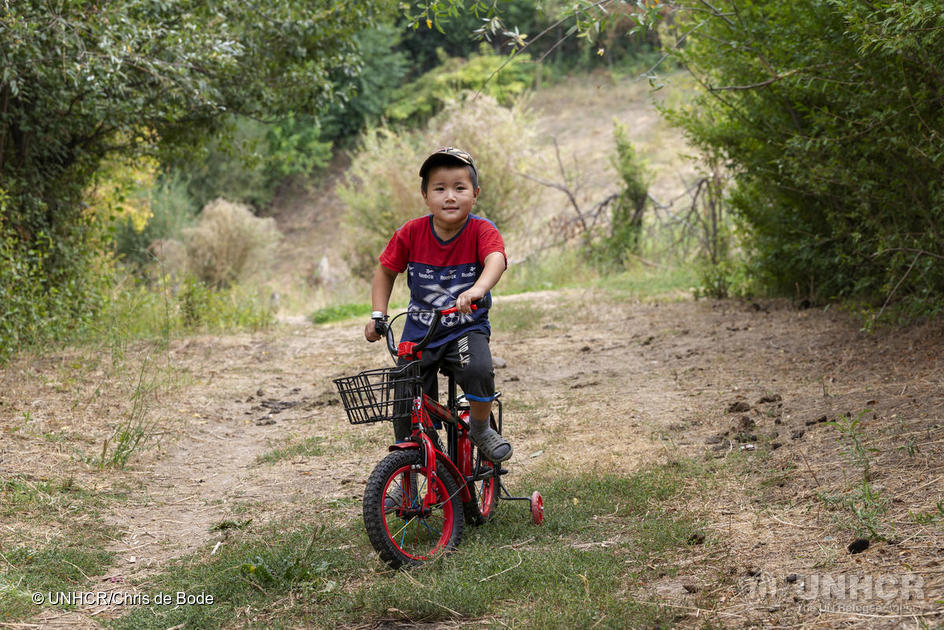
Five-year-old Kojomberdi Saydaliyev plays on his bike outside his family home in Pravda village, Osh, Kyrgyzstan. He and his family recently got Kyrgyz citizenship thanks to the efforts of UNHCR’s 2019 Nansen Refugee Award-winning lawyer, Azizbek Ashurov, and his NGO.
GENEVA – UNHCR, the UN Refugee Agency, today welcomes a new law in Kyrgyzstan, coming into effect on 24 June, to ensure that all children born in the country will be registered at birth, regardless of whether their parents are undocumented or stateless.
The move is the latest in a series of crucial, positive measures taken by the country to prevent and resolve statelessness.
Under the new law, even children already born to undocumented or stateless parents and who previously could not be registered will soon be issued with birth certificates. A survey conducted by the Kyrgyz Government in 2022 indicated that the children of at least 5,000 families stand to benefit from this decision.
The right to be registered at birth is a fundamental human and legal right and is an integral part in the prevention and reduction of statelessness.
Being undocumented is not the same as being stateless. However, the lack of birth registration can put people at a greater risk of statelessness as a birth certificate provides proof of where a person was born and their parentage – key information needed to establish a nationality.
Without a legal proof of identity, children are left unaccounted for. They are invisible to governments and at risk of not having their rights protected and upheld. Without a birth certificate, children are unable to get routine vaccines and may be unable to attend school or have access to social protection.
The Kyrgyz Republic’s commitment that all children born in the country will have access to birth registration and birth certificates regardless of the documentation of their parents fulfills two out of four pledges made in 2019 at the High-Level Segment on Statelessness, an intergovernmental meeting of UN Member States and other stakeholders.
UNHCR will continue to support and encourage the Kyrgyz Government to consolidate this success by becoming party to the UN Conventions of 1954 and 1961 on statelessness.
UNHCR also applauds recent efforts taken by the Kyrgyz Republic to revise its Law on Citizenship which, as of February 2023, aligned the definition of a stateless person with provisions of the 1954 Convention Relating to the Status of Stateless Persons and introduced safeguards against statelessness in citizenship renunciation.
In 2019, the Kyrgyz Republic became a leading example of how statelessness can be eradicated by becoming the first country in the world to resolve all known cases of statelessness. More than 13,000 stateless people who either held expired Soviet or foreign passports or no documents at all were assisted in getting citizenship.
These people lacked access to some of the most basic rights and UNHCR, with the Kyrgyz Government and civil society, worked together to find a solution to the problem as part of the global #IBelong Campaign to End Statelessness by 2024.
Globally, statelessness affects millions of people – of whom approximately one third are children – often denying them access to basic rights and official recognition that most people take for granted.
For more information on this topic, please contact:
Share on Facebook Share on Twitter